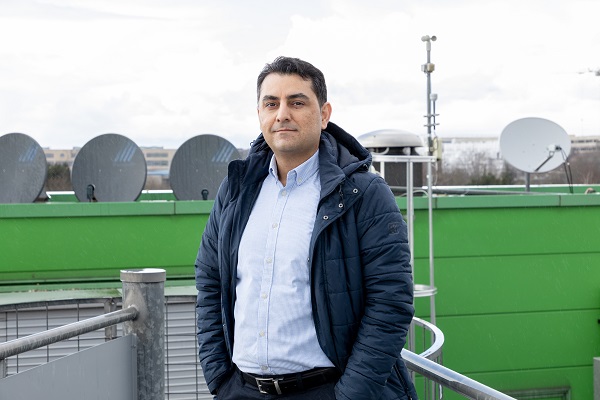 Ahmed Gharanjik, CEO & Founder of Databourg;
Credit: University of Luxembourg
Ahmed Gharanjik, CEO & Founder of Databourg;
Credit: University of Luxembourg
Rain nowcasting, a technology used to warn of imminent flash flooding and other extreme weather events, has been reimagined by the start-up Databourg Systems, the first space sector spin-off to come out of the University of Luxembourg’s Interdisciplinary Centre for Security, Reliability and Trust (SnT).
Databourg’s innovative nowcasting technology aims to address a crucial need as flash flooding is an ever-present threat today because of climate change. Nowcasting technology forecasts rain events in a range of one to six hours and is used for immediate decision making. The information it provides allows officials to do anything from rerouting traffic to issuing a flash flooding warning.
Yet, traditional nowcasting uses computational methods that are slow and insufficiently accurate, meaning that it doesn’t give detailed localisation information. This made it challenging to get a real picture of what was at risk. Databourg has changed this, using new technology and data sources to create a system that significantly improves the accuracy and speed of nowcasting.
A unique characteristic of the nowcasting method Databourg Systems has developed is that it uses a completely new data source for rain measurement: the fluctuations of satellite signals. In the satellite industry, rain can cause a TV signal that reaches a viewer’s home to be degraded, which is referred to as rain fade. Satellite operators use a variety of techniques to avoid this degradation for the end consumers, but the data about the rain is in their systems. The founder of Databourg, Dr Ahmad Gharanjik, realised during his PhD at SnT that this data about signal fluctuations could be used for the practical application of nowcasting if it was enriched. By taking the data about the ebb and flow of rainstorms as they move across a satellite’s communication footprint and fusing it with other data, such as radar data, he made it possible to generate a highly accurate map of rainfall in a specified region, in real-time.
The other distinctive element of Databourg’s method is that it is based on deep learning technology that enables it to outperform existing prediction models. Traditional numerical weather prediction (NWP) models are computationally intensive and require two to three hours to provide a new forecast, which impacts their accuracy and resolution. By using deep learning technology, the Databourg model processes all the data it has to provide a new forecast in less than a minute and does so more accurately.
The start-up recently launched the first iteration of their nowcasting service for two markets. For the public they are providing the technology free of charge, while businesses are able to access a version tailored for their needs and use cases. Currently they are focused on the SatCom and insurance industries for this second market but intend to expand quickly.
“Databourg Systems wouldn’t have happened without the unique ecosystem we have in Luxembourg and at the SnT. I received support from SnT’s Tech Transfer Office, and even before that the high level of scientific expertise from the research team helped develop my research and turn it into a commercial product,” said Dr Ahmad Gharanjik, CEO and Founder of Databourg. “Doing my research here made it possible to receive invaluable support from a leading satellite operator, as well as backing from the Luxembourg Space Agency (LSA) and National Research Fund (FNR) because of the national strategy promoting space-related business and research. I have also been fortunate to work with the European Space Agency. This environment has given us every chance of success".
Dr Carlo Duprel, Head of the Technology Transfer Office at SnT, added: “Databourg represents all the best elements of the kind of research we do here at SnT. By executing research in close collaboration with industry, Ahmad was able to take an everyday element of business for one of our partners, satellite signal data and turn it into a completely new service that also provides a public good. We are very proud of everything Databourg has already achieved as SnT’s first spin-off in the Space sector. We will continue to support them well into the future".








